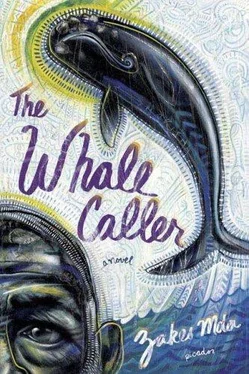“They roam the countryside … on their own.”
“The countryside is safer than the town.”
“I’ll look after them, man. They will be with me all the time.”
“I know you mean well, Saluni. But I can’t allow it.”
“You know people make a lot of money during the Kalfiefees. They dance… they sing… and the stupid tourists give them money. I know a boy there who is making a lot of money singing for tourists. Lunga Tubu. And his voice is not even angelic. It is a voice of this earth. There is money for the taking in town … especially if you have a beautiful voice like the twins.”
“So that is what you want, Saluni, to make money from my children?”
“I don’t want their money, man. I just want to record with them. You heard us singing just now, when you came home. You heard how good we are together. We can be world famous, man. The twins and I can be world famous. You have read about the children who become stars. They build houses for their mothers. They buy cars for their mothers. They take their mothers overseas for holidays. You won’t have to go to the vineyards again, man. You won’t have to hawk scrap metal and bones.”
“I forbid it, Saluni! I forbid it,” screams the mother almost hysterically. “They will steal my children’s voices.”
This is the second full moon in the same month — it only happens once every three years. It is a blue moon. The Whale Caller is as blue as the moon. Even though there is very little communication between him and Saluni these days, he does miss her when she is not there. Especially when she spends the night away from the Wendy house. Perhaps at the mansion. Or even at the taverns. She comes and goes without telling him where she has been or where she is heading. He surmises from the wine fumes that she has been to the taverns, or from euphoria that she has been to the mansion. The euphoria, of course, is never shared with him. She becomes euphoric alone in the corner, giggling to herself and sighing repeatedly, and then gets into bed, turning her back on him. Sometimes she is gloomy and he suspects that she has been to Mr. Yodd. Even though she manages to defy Mr. Yodd’s attempts at flagellation, she cannot but be gloomy after confessing at the grotto. He knows that Mr. Yodd never gives up. As long as she continues to go there bearing oblations of fruit and flowers Mr. Yodd hopes he will finally manage to humiliate her with his laughter.
On this blue night the Whale Caller sits under the blue moon at the tip of his peninsula. He is bathing his body in the smells of the night while waiting for dawn to bring Sharisha and the child from the estuary to the open sea. In the meantime he blows his kelp horn softly, practising a new song he has composed for the mother-and-child dyad. It is a variation on Sharisha’s song, but now with trills and warbles that are repetitive enough to make an impression on the young one. His only audience is a lone dolphin that is digging out prey in the sand under the water with its bottle nose. It must be the blue moon, the Whale Caller concludes, that has deceived the dolphin into foraging in the deep of the night. The blue moon does many strange things. Hopefully it will bring watermaids frolicking on the surface of the water, dancing to his kelp horn. Saluni. She used to be a water maid during their happy moments. He used to watch her playing in the sea. Saluni. Where could she be on this blue night?
At sunrise the Whale Caller sees a distant silhouette of a whale followed by a calf. It can only be Sharisha. The child is eleven months old and Sharisha no longer indulges it by carrying it on her back. Instead it has learnt to keep up with her. He blows his new song and the whales slowly sail towards the peninsula. They take their time, occasionally stopping to play with the floating kelp, pushing it and tossing it back and forth. And then touching and nudging at each other. The Whale Caller enjoys it immensely when the child mimics everything that Sharisha does. When she sails with her mouth open, exposing the baleen that looks like long piano keys, the child does the same. For some time the two sail towards him displaying these broad smiles.
When they get close enough Sharisha teaches the child a new trick: tail-sailing. Although this is a display especially for the Whale Caller, it is quite different from the tail-slapping, the mating ritual that used to be a crucial form of bonding between the Whale Caller and Sharisha. In tail-sailing Sharisha stands on her head in the water with her tail sticking above the surface. The child does likewise, and it is as though they are in competition to see who will remain in that position the longest. The Whale Caller stands up and laughs, clapping his hands, with his kelp horn under his arm. And then he whips it out and blows it in a celebratory flourish.
Saluni arrives and catches him at this unguarded moment when he is so carefree and jubilant with only the two whales as his audience now that the dolphin has left the space to them. She wonders why this man is never so carefree with her. What is it that she is supposed to do to make him prance about as he is doing for the stupid whales? She finds the effect they have on him pathetic and she hates them even more for doing what she has failed to do. The Whale Caller sees her and suddenly stops in embarrassment and sits down on a rock. The whales take their cue from him and stop their tail-sailing antics. Instead they float about, now communing with their perfectly V-shaped blows. There are hollow sounds in two-part harmony as mother and child produce clouds of vapour by expelling air and tiny drops of mucus from their lungs through each pair of blowholes. There is no way the child can outdo Sharisha’s big and prolonged blows.
Saluni gingerly crosses the treacherous neck of the peninsula, coming very close to where he sits. He longs to talk to her but on previous occasions when he has taken the initiative to open up dialogue she has lashed back either with chilly silence or some hurtful remark that is directed at whatever object is in sight but is really meant for him. He expects her to do her usual thing, walk by flaunting her slim figure, and then smother someone else with love. But it is too early in the morning and there is no Lunga Tubu to mother. There will not be any Lunga Tubu for the whole day. For the whole week even, since he spends all his time at the Kalfiefees where there are better pickings.
The Whale Caller pretends he is oblivious to her presence and focuses on the blows of the whales. She has a brilliant idea. Although it now comes as her own original idea, it was first suggested to her by Mr. Yodd at one of her regular confessions. Change the tactics. If you accommodate his obsession with the whales, you might beat Sharisha at her own game. From now on she won’t show any hostility towards Sharisha in the presence of the Whale Caller. She will wage a subtle war. Psywar! She will make life difficult for the behemoth when no one is watching, and be friendly towards it when he is around. She will not utter another word against Sharisha to the Whale Caller.
She stands in front of the Whale Caller and smiles. He is not sure whether it is safe to smile back. This may be a trap. She may be inviting him to smile back in order to mow him down with her tongue. He shifts his position and focuses on the two whales. She playfully skips to a new position so that once more she stands in front of him, smiling.
“Come on, man,” she says. “Don’t be such a sourpuss. It is a beautiful day.”
“You’ve come from the Bored Twins then and not from the taverns?”
“What has anything got to do with it? It is a beautiful day and your two whales are beautiful. I like the water spouting out of their heads.”
“Beautiful? Since when, Saluni? You scare me when you say such things.”
Читать дальше












